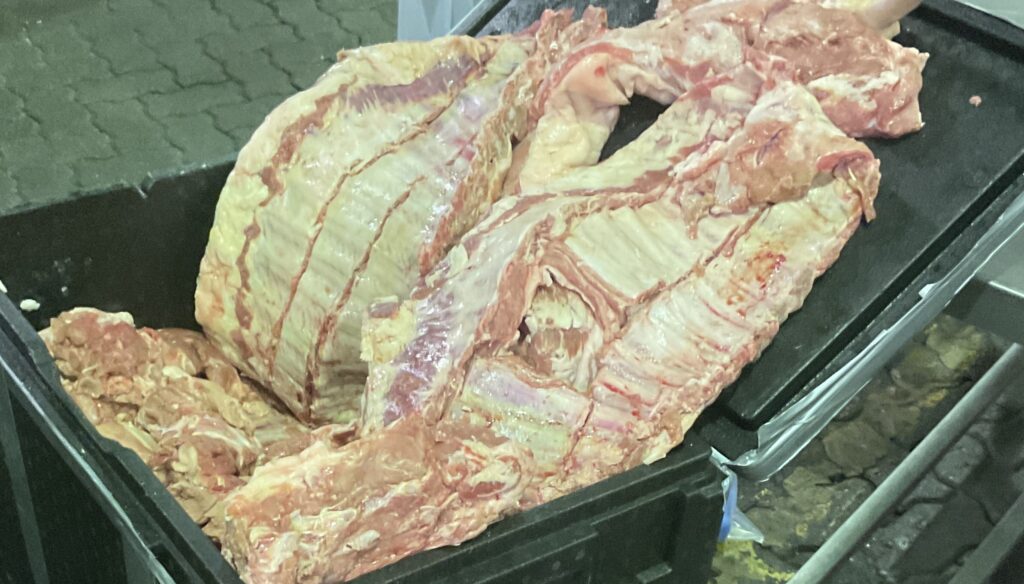An influential committee of MPs has accused the government of sleepwalking into its next big food safety crisis and has urged it to take action to stem flow of illegal imports entering the UK in unacceptably large volumes.
In a damning report on its inquiry into ‘Biosecurity at the border’, the Environment, Food and Rural Affairs Committee concludes that ‘alarming amounts of meat and dairy products are now being illegally imported to Great Britain for both personal consumption and sale’.
In March, the Committee visited the Port of Dover and witnessed a van being searched with meat found packaged in plastic bags and newspaper, stowed in cardboard boxes and in a defrosted chest freezer. Members were ‘greatly concerned’ to see the inadequate conditions the Border Force facilities at the Port with limited ability to decontaminate inspection areas and no dedicated handwashing facilities.
One worker told MPs they had ‘found an entire pig stuffed inside a suitcase; its legs cut off badly so that it could fit inside. Not a professionally butchered animal’.
Workers from Dover Port Health Authority (DPHA) told the Committee that, ‘there are literally hundreds of targeted vehicles driving straight past as we do not have the resources to stop and search’.
Among the key findings and recommendations, MPs:
- Contested Defra’s reassurance that ‘intelligence led checks’ are being performed at the border.
- Said it was ‘unacceptable’ that there is no clear, publicly available data showing the scale and nature of the illegal meat entering the country and its destination.
- Found there was no effective deterrent to meat smuggling and called on Defra to deliver a plan to immediately start fining and prosecuting repeat offenders.
- Called on Defra to create a strategy for product of animal origin (POAO) smuggling.
- Described Defra’s ban on personal imports of most meat and dairy from the EU as ‘toothless’, with prohibited animal products continuing to freely enter the UK.
- Described the 20% operational coverage for DPHA’s anti-meat smuggling operations at the Port of Dover as ‘insufficient’ and called on Defra to work with Border Force and the Dover Port Health Authority (DPHA) to restore damaged relations between them.
- This includes ‘repurposing’ the Bastion Point facilities at Dover to enable more effective work in tackling the huge illegal meat import trade through the port.
Unacceptable
The report highlights that illegal meat imports, which have been increasing for a number of years under a succession of Governments, carry a high risk of animal diseases that threaten food security, farming and the economy, including foot and mouth disease and African swine fever (ASF).
The MPs state that it is ‘unacceptable’ that there is no clear, publicly available data showing the scale and nature of the illegal meat entering the country and its destination. They warned of large and increasing volumes of illegally imported meat finding its way on to high streets, farms, markets, restaurants and kitchen tables.
Contesting Defra’s reassurance that ‘intelligence led checks’ are being performed at the border, the committee summarises the reality on the ground as ‘a limited and incomplete intelligence network, strained enforcement capability, and port facilities unsuitable for seizing significant volumes of potentially contaminated meat’.
The MPs call on Defra to deliver a plan to immediately start fining and prosecuting repeat offenders and those who are attempting to smuggle significant amounts of animal products to introduce some sort of deterrent. The committee notes Defra’s plans to crush vehicles carrying illegal imports, announced by former Defra secretary Steve Reed in January, but warns this is ‘not a silver bullet’ to solve the problem.
The Committee found that there is currently no identifiable or effective ownership of the issue of illegal meat smuggling within government. It called on Defra to create a strategy for product of animal origin (POAO) smuggling, in collaboration with the National Food Crime Unit (FSA), the Scottish Food Crime and Incidents Unit (FSS), port health authorities, inland local authorities and Border Force.
The report also finds that ‘public awareness of animal disease risks is low, as is awareness of the rules about what food you can bring into the country for personal use or as a gift’, and called for broader communications and public awareness campaigns from the Government.
Sleepwalking into a crisis
EFRA chair Alistair Carmichael said: “Every day, vans laden with undeclared, unhygienic and unrefrigerated meat are rolling through our ports for distribution and sale in Britain. The authorities tasked with tackling this wave of illegal produce find themselves without the necessary leadership, resources and intelligence to do so.
“It would not be an exaggeration to say that Britain is sleepwalking through its biggest food safety crisis since the horse meat scandal. A still bigger concern is the very real risk of a major animal disease outbreak. The single case of foot and mouth disease in Germany this year, most likely caused by illegally imported meat, cost its economy one billion euros.
“This problem has been building over a number of years under successive governments. We are calling on this Government to get a grip on what has become a crisis, by establishing a national taskforce with proper leadership and a strategy, boosting food crime intelligence networks, creating and enforcing real deterrents to tackle the criminal enterprises involved and equipping port health and local authorities with the resources and the powers they need.”
Government response
A government spokesperson said: “This government has significantly increased seizures of illegal meat, restricted the import of dangerous animal products, and is investing over £200 million in a new National Biosecurity Centre.
“We will consider the recommendations of the EFRA committee as we continue to work closely with port operators, industry, trade partners and Border Force to protect our food security, farmers and economy.”




